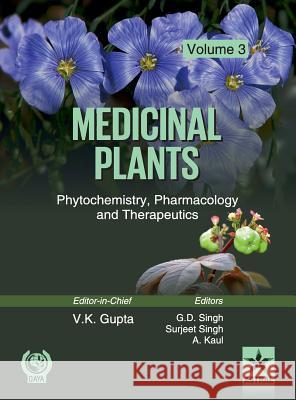Medicinal Plants: Phytochemistry, Pharmacology and Therapeutics Vol. 3 » książka
Medicinal Plants: Phytochemistry, Pharmacology and Therapeutics Vol. 3
ISBN-13: 9789351300977 / Angielski / Twarda / 2014 / 538 str.
The use of plants for treating diseases is as old as the human species. Medicinal plants continue to play a central role in the healthcare system of large proportions of the world's population. The history reveals that medicinal plants have traditionally served as mans most important weapon against pathogens. People use traditional, natural remedies for curing different types of disease and even in the next millennium the herbal medical practice will forge as important remedy to treat various disorders. This is particularly true in developing countries, where herbal medicine has a long and uninterrupted history of use. Recognition and development of the medicinal and economic benefits of these plants are on the increase in both developing and industrialized nations. Medicinal plants are treated as a subject of serious study and are undergoing intense research all over the world. The present volume of the book series "Medicinal Plants: Phytochemistry, Pharmacology and Therapeutics - Vol. 3," has been compiled from as many as 25 research and review communications from the eminent scientists across the world and includes interesting contributions in diverse topics like - Phytochemistry, Pharmacology and Therapeutics of Hemidesmus indicus; Review on Phytopharmacological and Ethnobotanical Aspects of Cassia alata; GCMS Screening for Phytocontents in the Essential Oil of Coleus forskohlii; Pharmacological Approaches to the Anti-inflammatory and Analgesic Effects of Pluchea arguta; Assessing the Beneficial Effects of a Magnolia Extract Supplemented with Phosphatidylserine; Naringin, a Citrus Flavonoid Protects Mice Against the Benzo(a)pyrene-Induced Forestomach Carcinoma; Pharmacological and Therapeutical Profile of Terpenoids; Biological Activities, Phytochemistry and Industrial Potentials of Khaya senegalansis; Phytochemistry and Pharmacology of Portulaca olearacea; Mango Pulp: A Potential Source of Natural Antioxidant and Antimicrobial Agents; Antineoplastic Action of Aphanamixis polystachya in Mice Transplanted with Ehrlich Ascites Carcinoma; Antihyperglycemic and Antihyperlipidemic Profile of Morinda lucida; Anti-diabetic Effect of Ethanol Extract of Stem Bark of Ficus bengalensis; Review on Phytochemistry and Pharmacological aspects of Jatropha gossypifolia; In vitro Effects of Curcuma xanthorrhiza on Glutathione Transferase Activity; Phytochemical Studies on Gracilaria pygmaea using TLC, FT-IR and HPLC; Linseed: A Review on Phytochemistry, Pharmacology and Therapeutic Potentials; Herbal Products as Adjuvants or Biomodulators in Diabetic Therapy; Phytochemical and Histochemical studies on different species of Selaginella; Amazon Piperaceae with Potential Insecticide Use; Cannabis and Cannabinoids: Phytochemistry, Pharmacology and Therapeutics; Nephrotoxicity and Hepatotoxicity Evaluation in Wistar Albino Rats Exposed to Nauclea latifolia Leaf Extracts; Amazonian Medicinal Plants: Current Applications in Dentistry; Radical Scavenging Effects of Alpinia galanga and Curcuma zedoaria; Essential Oil Constituents of Rhizome Oil of Alpinia Species. I hope the present volume will be of interest to a wide range of audience including phytochemists, biochemists, pharmacologists, ethnobotanists, and other medical and research scientists engaged in the research on medicinal plants.











